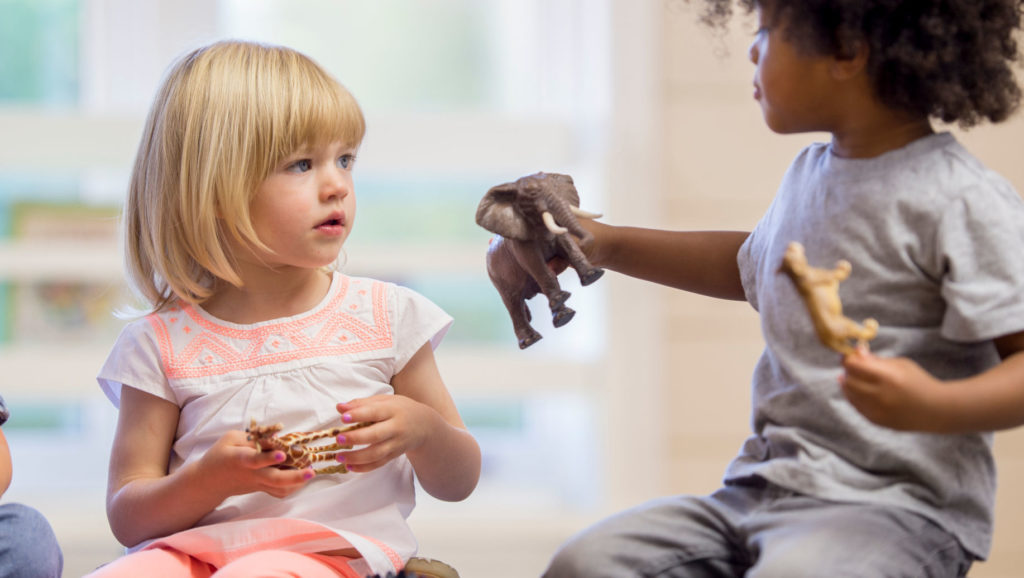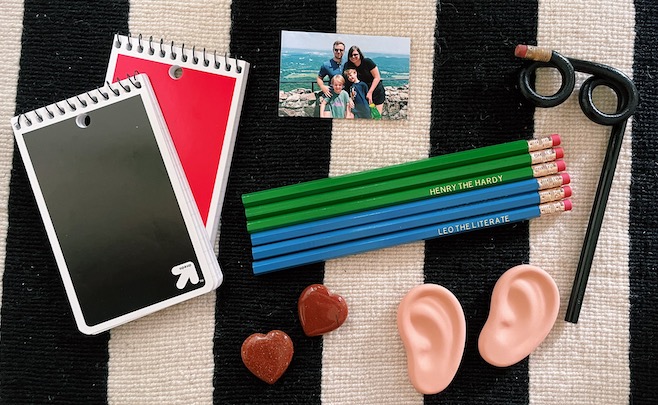3 Tips for Raising Kind, Resilient Kids
 At the start of school, we gave each of our boys a family picture, an eraser shaped like an ear (an EARaser!), and pencils labeled with our hopes for the year ahead.
At the start of school, we gave each of our boys a family picture, an eraser shaped like an ear (an EARaser!), and pencils labeled with our hopes for the year ahead.
For our youngest, on his way to kindergarten where he’ll learn to read and write, a cheeky “Leo the Literate.” And for our oldest, bound to face challenging lessons, stricter schedules, and maybe even a bully or two, we went with “Henry the Hardy.”

Kindness has long been a virtue in our home. Adventure and wisdom too.
And while these things no doubt build resilience, we’re learning that it’s a tricky balance teaching kids to be thoughtful of others while also maintaining confidence, boldness, and determination within themselves.
Time to bring in an expert: How can we raise kids who are both helpful and hardy? Sweet and strong? Friendly and flexible? Respectful and resilient?
I talked with Ashley MacNish, M.A., Educational Consultant with the Family Engagement Group of Hemmeter Lab at Vanderbilt University, whose work serves to build social-emotional development in children and families through research and innovation.
Ashley shared three tips you can implement today that will go a long way toward your parenting goals—printed on pencils and otherwise.
3 Tips for Raising Kind, Resilient Kids
Choose Your Words Wisely
To start, Ashley encourages parents to speak with the end in mind. She explains: “Use positive and specific language to communicate the behavior you want to see.”
So, instead of saying, “Don’t be rude!” say, “Be kind.” Here’s why: kids tend to gravitate toward the exact words we use, meaning we might inadvertently encourage bad behavior.
Ashley also reminds us to be specific. Expound on your “Be kind” statement with something like, “Can you say that again in a calm, kind voice?” By choosing your words carefully, you help to reset your child’s mind and give him clear, concise directions to follow. Directions that, with practice, can become (almost) second nature.
This works for resilience too. You might try phrases like:
- “If you’re feeling overwhelmed, try again or ask for help.”
- “It’s okay to be firm. Say, ‘Do not touch me.’ Tell an adult if it happens again.”
- “Just take the first step. Then, when you’re ready, take another.”
And when your kids follow through on your guidance, be sure to brag it up! Let him know how much you appreciate his efforts and—as Ashley explains—expect your purposeful praise to encourage a repeat of good behavior in the future.
Teach Two Key Skills
Our words offer solid reminders of the behaviors we’re hoping for, but we’d also like to teach our kids to be kind and resilient even when we’re not around. Ashley suggests helping kids develop confidence in two key areas:
- I am able to calm big emotions. Between sibling rivalry, chores, homework, and strikeouts, kids are bound to feel some big emotions. Remind your child to take a deep breath when he feels upset, which gives the brain and body time to pause and think before moving forward. You can work together to come up with other ways he might slow down in moments of stress or anxiety. Ashley encourages parents to hang a visual reminder of calming ideas so kids can practice these actions on their own.
- I am able to solve my own problems. Anticipate problems that might arise before you meet up with friends or your child takes on a new challenge. Discuss strategies for the “what-ifs” and remind your kid that he is smart and capable–and that you’re always available to help if he needs you. Then, when actual problems arise, resist the urge to step in right away. Take a beat—he might surprise you by solving things on his own!
After all, the goal isn’t just to raise kind, resilient kids but to raise kind, resilient adults. And that’s going to require an ever-so-slowly-growing independence.
Consider Your Home a Haven
Above all else, Ashley encourages us to nurture our relationships with our kids and to create an environment that feels safe and secure.
Regarding resilience, she explains: “When a child’s brain is built by positive early experiences and strong and emotionally safe attachments to his caregivers, he is better able to buffer the impact of stress when it occurs.”
And as for kindness? Ashley goes on to say, “Those nurturing and responsive relationships help children to feel loved and to learn what a healthy relationship looks and feels like as they grow and navigate the world.”
When home is a haven, our kids learn to disagree with siblings in a way that respects both parties, to treat others with kindness in both word and deed, and to expect kindness in return from close friendships as they grow.
And when home is a haven, our kids learn that it’s okay to take a risk, make a mistake, or fail miserably, because there is always someone waiting with open arms to give a hug, talk through pain and join them in brainstorming the best way forward.
Of course, home as a haven means we’ll also need to manage our own stress responses and regularly model the kind and resilient behavior we’d like to see in our kids.
Thankfully, we’re not going for perfection here. On the contrary, Ashley says, “I think you need to take perfection out of it because we are humans and we make mistakes. It’s reframing your mindset, so that when you do make a mistake, you ask, ‘How can I make this a learning opportunity for myself and my child?’”
After all, we’re learning and growing together.